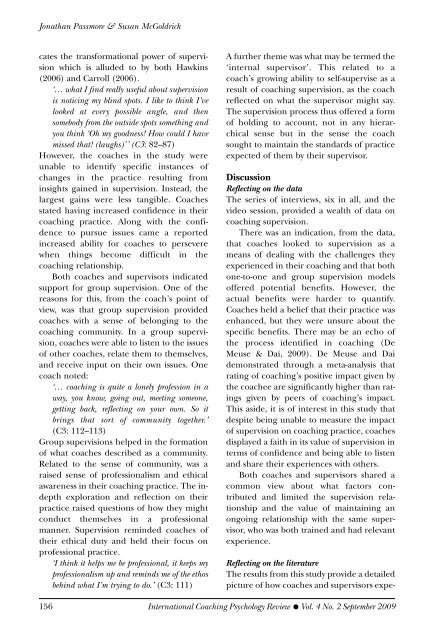International Coaching Psychology Review, 4.2, September 2009
International Coaching Psychology Review, 4.2, September 2009
International Coaching Psychology Review, 4.2, September 2009
You also want an ePaper? Increase the reach of your titles
YUMPU automatically turns print PDFs into web optimized ePapers that Google loves.
Jonathan Passmore & Susan McGoldrick<br />
cates the transformational power of supervision<br />
which is alluded to by both Hawkins<br />
(2006) and Carroll (2006).<br />
‘… what I find really useful about supervision<br />
is noticing my blind spots. I like to think I’ve<br />
looked at every possible angle, and then<br />
somebody from the outside spots something and<br />
you think ‘Oh my goodness! How could I have<br />
missed that! (laughs)’’ (C3: 82–87)<br />
However, the coaches in the study were<br />
unable to identify specific instances of<br />
changes in the practice resulting from<br />
insights gained in supervision. Instead, the<br />
largest gains were less tangible. Coaches<br />
stated having increased confidence in their<br />
coaching practice. Along with the confidence<br />
to pursue issues came a reported<br />
increased ability for coaches to persevere<br />
when things become difficult in the<br />
coaching relationship.<br />
Both coaches and supervisors indicated<br />
support for group supervision. One of the<br />
reasons for this, from the coach’s point of<br />
view, was that group supervision provided<br />
coaches with a sense of belonging to the<br />
coaching community. In a group supervision,<br />
coaches were able to listen to the issues<br />
of other coaches, relate them to themselves,<br />
and receive input on their own issues. One<br />
coach noted:<br />
‘… coaching is quite a lonely profession in a<br />
way, you know, going out, meeting someone,<br />
getting back, reflecting on your own. So it<br />
brings that sort of community together.’<br />
(C3: 112–113)<br />
Group supervisions helped in the formation<br />
of what coaches described as a community.<br />
Related to the sense of community, was a<br />
raised sense of professionalism and ethical<br />
awareness in their coaching practice. The indepth<br />
exploration and reflection on their<br />
practice raised questions of how they might<br />
conduct themselves in a professional<br />
manner. Supervision reminded coaches of<br />
their ethical duty and held their focus on<br />
professional practice.<br />
‘I think it helps me be professional, it keeps my<br />
professionalism up and reminds me of the ethos<br />
behind what I’m trying to do.’ (C3: 111)<br />
A further theme was what may be termed the<br />
‘internal supervisor’. This related to a<br />
coach’s growing ability to self-supervise as a<br />
result of coaching supervision, as the coach<br />
reflected on what the supervisor might say.<br />
The supervision process thus offered a form<br />
of holding to account, not in any hierarchical<br />
sense but in the sense the coach<br />
sought to maintain the standards of practice<br />
expected of them by their supervisor.<br />
Discussion<br />
Reflecting on the data<br />
The series of interviews, six in all, and the<br />
video session, provided a wealth of data on<br />
coaching supervision.<br />
There was an indication, from the data,<br />
that coaches looked to supervision as a<br />
means of dealing with the challenges they<br />
experienced in their coaching and that both<br />
one-to-one and group supervision models<br />
offered potential benefits. However, the<br />
actual benefits were harder to quantify.<br />
Coaches held a belief that their practice was<br />
enhanced, but they were unsure about the<br />
specific benefits. There may be an echo of<br />
the process identified in coaching (De<br />
Meuse & Dai, <strong>2009</strong>). De Meuse and Dai<br />
demonstrated through a meta-analysis that<br />
rating of coaching’s positive impact given by<br />
the coachee are significantly higher than ratings<br />
given by peers of coaching’s impact.<br />
This aside, it is of interest in this study that<br />
despite being unable to measure the impact<br />
of supervision on coaching practice, coaches<br />
displayed a faith in its value of supervision in<br />
terms of confidence and being able to listen<br />
and share their experiences with others.<br />
Both coaches and supervisors shared a<br />
common view about what factors contributed<br />
and limited the supervision relationship<br />
and the value of maintaining an<br />
ongoing relationship with the same supervisor,<br />
who was both trained and had relevant<br />
experience.<br />
Reflecting on the literature<br />
The results from this study provide a detailed<br />
picture of how coaches and supervisors expe-<br />
156 <strong>International</strong> <strong>Coaching</strong> <strong>Psychology</strong> <strong>Review</strong> ● Vol. 4 No. 2 <strong>September</strong> <strong>2009</strong>

















